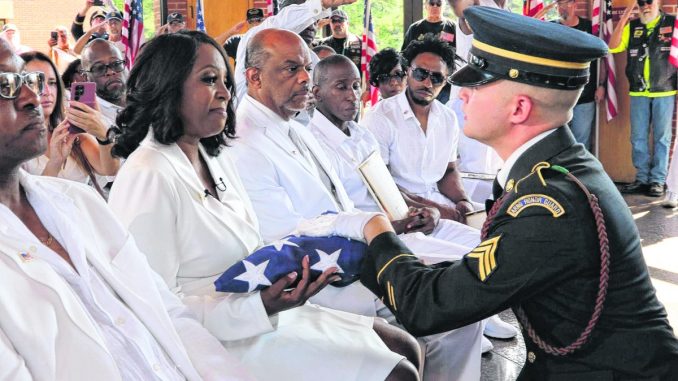
Cheryl Wills receives Sandy Wills’ veteran flag at her great-great-great grandfather’s recommittal ceremony.
Alonzo Boldin
Veteran Sandy Wills was buried with full military honors this past August – 135 years after his death.
The once enslaved man who had run away to fight in the Civil War in the U.S. Colored Troops and earn his freedom was forgotten and left to rot in an unmarked grave.
Forgotten, that is, until an unlikely discovery by his great-great-great-granddaughter, Cheryl Wills. After a 15-year-long investigation, the New York local would find her ancestor’s remains and face her history – and this country’s – in a way she would have never imagined.
“Of my 35 years of work in journalism, this is without question the most enriching story I’ve ever done,” says Wills, a New York 1 reporter and Emmy award-winning journalist.
As a child, Wills was enticed by stories her grandparents and parents told of life as a Black American under Jim Crow [laws that enforced racial segregation]. “I may not have known Sandy Wills, the Civil War veteran, but I certainly knew my parents and grandparents,” says Wills. “They dealt with trauma… and I felt that trauma, it affected our whole family.”
It would not be until she was an adult that she would learn of that missing history.
In an effort to learn more about her late father, a New York City firefighter and veteran from Tennessee, she uncovered her ancestor’s census records. Sandy had been honorably discharged from the military in 1866, married in Tennessee, and lived and worked on his former slaveowner’s plantation after gaining freedom.
Missing from the records about Wills’ late relative was a burial site for the American hero.
“When I realized a Civil War veteran was buried in an unmarked grave, I was completely devastated, but hopeful that I might one day get the chance to find him,” says Wills. “It was the proverbial needle in a haystack.”
That search began with Ethan West, her long-lost fourth cousin once removed, who found out about Wills’ search in one of her books, Die Free: A Heroic Family Tale. He went down to Haywood County in Tennessee to drive the backroads where Sandy once lived, where he found the farm Sandy had been enslaved on and later worked on… with the descendants of the former slaveowner still living there.
“This doesn’t really happen too often, where you meet the descendants of your family’s oppressor,” says Wills. “He oppressed them, he made them work against their will, and he took all the money, and they got nothing… it was truly surreal.”
But it was in those descendants that Wills found an unlikely ally. The Haywood County family, firmly on the wrong side of a dark history, was willing to help retrieve Sandy’s remains. Says Wills, “It was two American families coming together that were bonded through slavery.”
Along with 37 other unmarked graves on the property, Wills matched one site to Sandy’s height and year of death, with help from an archaeology team, and unearthed his fragmented remains. What was now mostly teeth and dirt would be given the military send-off he deserved, to lie in a veterans cemetery where his memory is honored.

This country’s history with slavery has sparked countless riots and defined many of the tensions in today’s America. It’s also a conversation that is so often ignored. “It’s America’s original sin, whether she wants to admit it or not, and we are the descendants.” Says Wills. “Black folks have no choice not to deal with it. Every single day, every time I read the news, I’m seeing it.”
Part of this history is the black soldiers of the Civil War – some 200,000 men and women who fought for their country and their personal freedoms. Brave people, many of them runaway slaves like Sandy, their stories have often gone ignored in education about the Civil War.
“Well, every kid has to learn the Civil War, right? Sadly, the contributions of the United States Colored Troops are not often highlighted during these lessons,” says Wills, the author of four books on the topic, two of which – Emma and The Emancipation of Grandpa Sandy Wills — are children’s books. “Through my books, I enter these auditoriums and classrooms as a descendant of a Civil War veteran, and I proudly share the stories of the 200,000 men who helped the Union win the war.”
Read More: Long Island veteran reunites with medic 56 years after Vietnam

